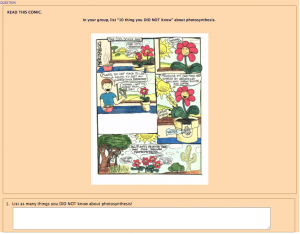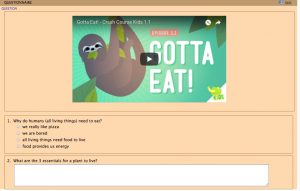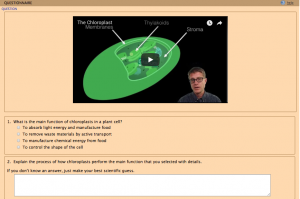I customized the Photosynthesis: Initial Ideas activity on the WISE platform. Personally, I have not taught science above grade 6. Therefore this was a topic I could relate to you. From the outset, I found the original inquiry project to be very text heavy with no visuals, audios or videos. I believe the creator of this project did not take into account the constructivist approach, where learning is active social and situated to alter and empower the learner and in this case through the use of technology.
The original Photosynthesis: Initial Ideas activity did not design and develop their project around the four key components for knowledge integration (Slotta, J. D., & Linn, M. C. 2009). First, making learning accessible is designed to guide students to hypothesize, investigate and make possible predictions. Moreover, asking them to interpret the results of activity based on their predictions. Second, the many multiple choice questions did not allow for making thinking visible. There were a few open-ended questions that did provide some opportunities for the learner to gain insight into their own learning. Third, this article noted the importance of the Learner from others. This project could have included peer review activities where students are guided to critique others thoughts and opinions. Especially, since this more of background knowledge project, it would be vitally important to conduct these types of discussion to alleviate any misconceptions about photosynthesis. Lastly, the authors illustrated that “WISE has many different tools and activities to promote autonomous learning, such as graphing, drawing, data collection, online discussion, note-taking concept-mapping, peer-exchange and reflection” (p. 70), none of the features were used in this project to enhance the learning for the student.
I altered the first three activities in this project to guide students in a more autonomous form of learning that reflects that nature of scientific investigation.
#1 I introduced the concept of photosynthesis by incorporating a comic strip. Constructivist educators believe that prior knowledge impacts the learning process (Vygotsky, Lev S. 1987). In trying to solve scientific problems students have the opportunity to construct new information into their existing understanding of photosynthesis actively.

#2 As reiterated in the Jasper project, video can be as good an instructional tool to give real-world facts or demonstrate procedural requirements that assist with solidifying the information into long-term memory. For this page, I video gives visual cues of the importance of food has for all living things.

#3 chloroplasts can be a complex concept for students to understand. The luxury of the video is that students can rewatch and understanding those misconceptions. By scaffolding the knowledge (SKI) through the WISE activities students are guided through the process of scientific investigation Furtak, E. M. (2006).

In closing, I did ask a colleague, with significant science and teaching experience, to navigate through the WISE platform. Interestingly, he came back saying it would not be an instructional tool he would use because the setup and limitation to customize the overall project would deter him from using in the future. I would like to further explore if there other options for providing effective science materials online.
Furtak, E. M. (2006). The problem with answers: An exploration of guided scientific inquiry teaching. Science Education, 90(3), 453-467.
Slotta, J. D., & Linn, M. C. (2009). WISE science: Web-based inquiry in the classroom. Teachers College Press.
Vygotsky, Lev S. 1987.. Collected Works of L. S. Vygotsky, Vol. 1: Problems of General Psychology, trans. Norris Minick. New York: Plenum.
Thanks for your post! I agree that the lesson was text heavy and visuals were missing from this specific project! That’s interesting that your colleague would not use WISE. What programs (online programs) does your colleague use to supplement their teaching? How did you feel about using WISE and editing the projects? Thanks!
Hello Amanda,
I like how we are MET “sistas” and our postings are quite similar because of our special education background. To answer your questions;
What programs (online programs) does your colleague use to supplement their teaching? How did you feel about using WISE and editing the projects?
From the outset of this module, I was thinking Moodle would be the most effective online collaborative tool. Moodle is being used by millions of teachers and students worldwide, as a tool for creating and embedding learning resources and providing educational activities such as forums, quizzes, workshops, assignments etc. Moodle is the Learning Management System (LMS) my school division uses. Supplementing regular classroom instruction, this online teaching space facilitates student learning, any time, any place, any path, and any pace. Teachers use Moodle to deliver content to students, interact in and outside of class time, and assess learning using assignments or quizzes. It features a variety of activity modules such as forums, databases, and wikis. It also can be used to create spaces where educators and support staff can collaborate and share resources for specific subject matters.
Inquiry-based learning is particularly well-suited for Moodle because Moodle was created to be a constructivist platform that has many tools to support inquiry-based learning.
Furthermore, BC Learning Network includes many different Moodle courses that can be easily remixed, similarly what we did on WISE.
~Mary
Hello Amanda,
I like how we are MET “sistas” and our postings are quite similar because of our special education background. To answer your questions;
What programs (online programs) does your colleague use to supplement their teaching? How did you feel about using WISE and editing the projects?
From the outset of this module, I was thinking Moodle would be the most effective online collaborative tool. Moodle is being used by millions of teachers and students worldwide, as a tool for creating and embedding learning resources and providing educational activities such as forums, quizzes, workshops, assignments etc. Moodle is the Learning Management System (LMS) my school division uses. Supplementing regular classroom instruction, this online teaching space facilitates student learning, any time, any place, any path, and any pace. Teachers use Moodle to deliver content to students, interact in and outside of class time, and assess learning using assignments or quizzes. It features a variety of activity modules such as forums, databases, and wikis. It also can be used to create spaces where educators and support staff can collaborate and share resources for specific subject matters.
Inquiry-based learning is particularly well-suited for Moodle because Moodle was created to be a constructivist platform that has many tools to support inquiry-based learning.
Furthermore, BC Learning Network includes many different Moodle courses that can be easily remixed, similarly what we did on WISE.
~Mary
What an awesome job you did on this project. I completely agree with you that too often we see a digitization of traditional print materials. This becomes an awfully expensive piece of paper when no other digital tools are utilized to enhance and engage students. I love your addition of a comic strip to kick off the understanding using a medium that is familiar and desired by students. The addition of videos (also a medium of preference to students) brings the learning to life and allows for a visual understanding of the information. We have to open more avenues to showcase that print is not a superior way to learn, it is but one option. Have you ever used EdPuzzle before. It allows you to use YouTube videos that already exist or that you create to insert interactive questions and responses for students while they are watching the video.
Trish
Hello Trish,
Thank you for your reply! No matter the subject I am teaching, I ALWAYS try to incorporate some component of literacy into the activity. This is where Pearson’s Math Makes Sense, did an excellent job highlighting books that mirrors the math concepts. I agree video enhances deeper understanding, but just as important is text (comics, stories). I have seen EdPuzzle and modified a project for a topic I was teaching, thank you for me reminding of that technology tool. With Ed Puzzle, the students are accountable to answer questions while they are watching, I like that feature.
Mary